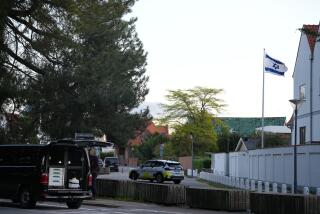Bombs Spur Security Boost at Israeli Sites
- Share via
WASHINGTON — Hours after two bombings in London, U.S. and European intelligence agencies issued new warnings Wednesday about possible further attacks against Israeli targets, leading to tightened security at hundreds of Israeli facilities and Jewish religious and cultural centers around the world.
In response to specific threats picked up by the FBI, the Israeli Embassy in Washington was effectively cordoned off Wednesday, while concrete barriers were erected around Israel’s consulate and U.N. mission in New York. In London, more than 100 Jewish and Israeli sites were placed under 24-hour police protection.
An anti-terrorism team in Los Angeles stepped up security at several locales. Late Wednesday, a police bomb squad blew open the trunk of an unattended car in the garage of the high-rise that houses the Israeli Consulate in the Mid-Wilshire district.
Police sources said it was unclear whether there were any explosives in the car.
Forensic tests are far from complete at any of four sites bombed over the past week in London, Argentina and Panama, but both U.S. counterterrorism officials and private experts are tentatively concluding that Islamic extremists linked to Lebanon’s Hezbollah, or Party of God, are responsible for at least three and probably all four attacks.
Hezbollah has denied involvement.
The London attacks “are consistent with the pattern we’ve seen in the past,” State Department spokesman Mike McCurry said Wednesday. “And that points toward involvement by radical factions including Hezbollah, with sponsorship and support by Iran.”
A senior U.S. official went further, tying together all four.
“These are parts of the same whole, whether or not they (the perpetrators) know about each other. Like spokes on an axle, they are probably cells linking back to one unit. The wave of attacks is not a coincidence,” he said.
U.S. and European experts now believe that the motive for the spate of attacks, the most deadly in years with more than 100 dead, was twofold: to retaliate for a series of recent Israeli raids on Hezbollah bases in Lebanon and to undermine progress in the Middle East peace process.
The specter of a renewed outbreak of international terrorism abruptly dampened the optimism of the previous two days, during which Israeli Prime Minister Yitzhak Rabin and Jordan’s King Hussein signed a historic document at the White House ending nearly half a century of warfare between their countries. Washington is believed to be a potential target because it hosted the signing.
A terse statement from the Israeli Embassy in Washington confirmed that security measures at offices across the United States were tightened after the bombings. The subsequent U.S. warning led authorities to take further actions.
In New York, huge Sanitation Department dump trucks, normally used to spread salt during winter storms, were filled with sand and rushed to two Israeli offices to serve as temporary barriers. They were later replaced by large concrete barriers, while heavily armed police emergency squads stood guard.
Although U.S. officials are wary of predicting the renewal of the kind of terrorism witnessed in the 1980s, Israeli and Jewish officials do not believe the attacks have ended.
“There are many groups in the Middle East intent on hitting the Jewish community in the foreseeable future,” said Mike Whine, director of the Board of Deputies of British Jews. “We are in for a tough time. There is concern and apprehension throughout the community now, and we must be on our guard.”
Terrorism specialists are concerned because of the magnitude of the recent attacks. Almost 100 died July 18 in a building in Buenos Aires that housed several Jewish organizations, while all 21 passengers, including 12 Jewish businessmen, perished the next day in the crash of a Panamanian commuter flight.
The London car-bomb attacks, one at the Israeli Embassy on Tuesday and the next at offices of several Jewish organizations early Wednesday, injured 19 people.
“The new dimension for us is the power and ferocity of the devices being put down and the total disregard for their own or anyone else’s lives by the terrorists involved,” Police Commissioner Paul Condon said Wednesday in London.
“These people are totally reckless. The timing on these devices is so short they are risking their own lives--they are almost suicide bombers.”
In Washington, terrorism specialist Bruce Hoffman of the Santa Monica-based RAND Corp. think tank said that all four recent bombings were highly professional, in stark contrast to the amateurs involved in the 1993 bombing of New York’s World Trade Center.
Wright reported from Washington and Tuohy from London. Times staff writers Shawn Hubler, Jim Newton and Kenneth Reich in Los Angeles and John Goldman in New York contributed to this report.
More to Read
Sign up for Essential California
The most important California stories and recommendations in your inbox every morning.
You may occasionally receive promotional content from the Los Angeles Times.













